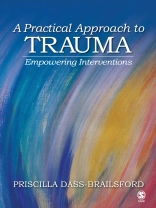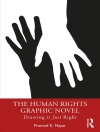A Practical Approach to Trauma: Empowering Interventions provides trauma counselors with effective guidelines that enhance skills and improve expertise in conducting empowering therapeutic interventions. Taking a practitioner’s perspective, author Priscilla Dass-Brailsford focuses on practical application and skill building in an effort to understand the impact of extreme stress and violence on the human psyche.
Key Features:
- Offers comprehensive coverage of trauma intervention: The wide coverage of the different levels of trauma— individual, community, institutional—and attention to the current theoretical and research literature makes this text the most comprehensive regarding trauma and its treatment.
- Highlights the intersection between trauma and culture: An ecological perspective focuses on the importance of viewing behavior within its social setting and examining the physical and psychosocial barriers to trauma recovery.
- Emphasizes the theme of ’empowerment’: Empowerment focuses on client strengths as the practitioner is encouraged to support clients towards resiliency.
- Provides an extensive historical background: The book examines multigenerational trauma experienced by several ethnic minority groups.
- Includes case studies and worksheets: Case studies gleaned from the author’s clinical experience provide a snapshot of the field and make the work of trauma come alive.
Intended Audience:
This is an ideal text for advanced undergraduate and graduate courses on psychological trauma in the departments of Counseling, Psychology, Human Services, and Social Work. It is also a useful resource for practicing clinicians.
Table des matières
Preface
Ch 1: Overview of Trauma
Ch 2: Assessment of PTSD, ASD, and DESNOS
Ch 3: Models of Trauma Treatment
Ch 4: Empowering Interventions
Ch 5: Crisis Interventions
Ch 6: Group Psychotherapy for Trauma Survivors
Ch 7: Community Trauma and Working in the Schools
Ch 8: Traumatic Stress Debriefing With Adults
Ch 9: Children and Adolescents
Ch 10: Treating Interpersonal Violence
Ch 11: Treating Political Refugees
Ch 12: Terrorism
Ch 13: Natural Disasters
Ch 14: Helping the Helper
Appendix I. Common Reactions to Trauma
Appendix II: Coping With Trauma
Appendix III: Coping With Grief and Loss
Appendix IV: Helping Children Cope With Loss and Grief
Appendix V: Client Safety and Self-Care Worksheet
Appendix VI: Deep/Diaphragmatic Breathing
Appendix VII: Progressive Muscle Relaxation
Appendix VIII: Stages of Burnout
Appendix IX: Counselor Self-Care: Beliefs, Conflicts, and Rewards
Appendix X: Trauma Assessment Tools for Adults
Appendix XI: Trauma Assessment Tools for Children and Adolescents
A propos de l’auteur
Priscilla Dass-Brailsford is an Associate Professor in the Division of Counseling and Psychology at Lesley University. She has worked with underserved and chronically traumatized populations specifically in child advocacy and sexual abuse evaluations. Additionally, Dr. Dass-Brailsford coordinated a state-wide crisis team, the first of its kind at its inception, which responded to incidents of community violence. Dr. Dass-Brailsford’s research projects are multiple: resiliency in the aftermath of political trauma and socio-economic stress; the effects of community violence, multicultural research on institutional trust and racial identity; the effects of secondary trauma on first responders and other volunteers; and the benefits of walk-in mental health services for disaster survivors. She was a first responder in New York after the terrorist attack in 2001 and deployed to New Orleans immediately after Hurricane Katrina (2005). She has returned to the area several times to work with mental health providers. This edited book was inspired by her work with the survivors of Hurricane Katrina; it is a testimony to their resiliency despite the challenges of loss, dislocation, recovery and reconstruction.












